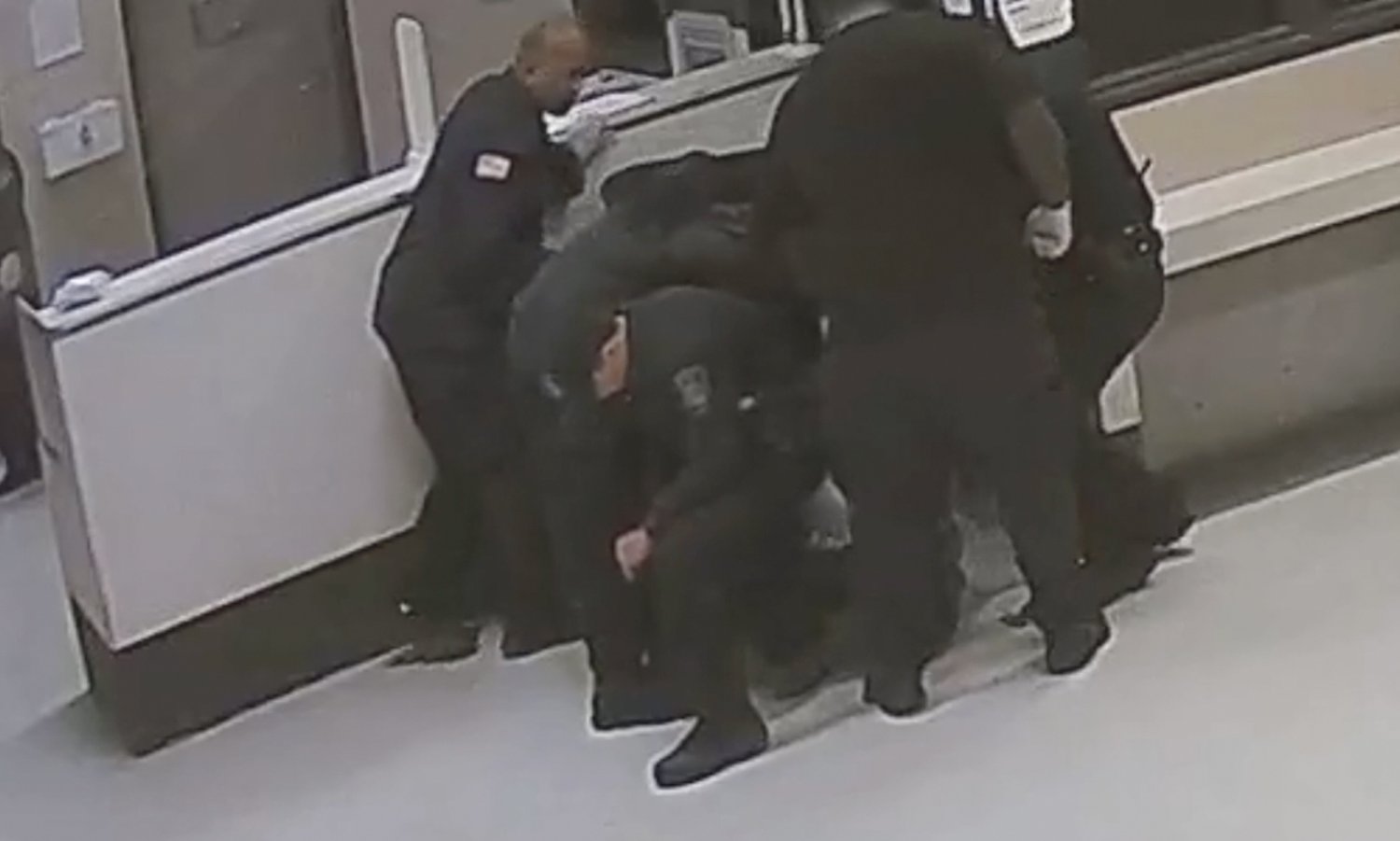Mississippi Today
Grenada officers can be sued in jail death, judge rules
Grenada officers can be sued in jail death, judge rules
A federal judge rejected the claim that Grenada police officers should be protected by qualified immunity in the 2018 death of Robert Loggins in the local jail.
The ruling by U.S. District Judge Sharion Aycock moves the case one step closer to trial in Mississippi.
“The court’s decision is an important milestone in the family’s quest for justice, and they are prepared to fight for as long as it takes,” said Jacob Jordan of the Levy Konigsberg LLP law firm, the attorney for Loggins’ family.
A video obtained by the Mississippi Center of Investigative Reporting at Mississippi Today shows Loggins rolling when officers and jailers piled on top of him inside the Grenada County Jail. It also shows officer kneeling on his neck.
Three and a half minutes later, they got off of him. He never moved again. More than six minutes passed before anyone checked his pulse or breathing.
Despite that, the state of Mississippi concluded Loggins’ death was an “accident.” The alleged culprit? Methamphetamine toxicity.
After viewing the video as well as the autopsy report and the photos, renowned forensic pathologist Dr. Michael Baden concluded the death was a homicide. “They killed him by piling on top of him,” he said. “He absolutely died from some kind of asphyxia.”
Loggins’ death came two years before the 2020 murder of George Floyd. All the officers who played a role in Floyd’s homicide were fired and convicted on criminal charges.
Minneapolis police officer Derek Chauvin, who knelt on Floyd’s neck, was sentenced to two decades behind bars. Three other officers were each sentenced to between two and a half and three and a half years in prison, including one officer who kept bystanders away.
The Grenada officer who kneeled on Loggins’ neck has never faced any criminal charges, nor has any other officer.
Baden considers the officers’ actions in the Loggins’ case much worse. “The intentional brutality inflicted on Loggins,” he said, “who was in an acute mental crisis, having done nothing criminal, makes his death — and many, many others — so much more criminal than Floyd’s.”
Baden compared the Loggins’ case to the Jan. 10 death of Tyre Nichols, whom five Memphis police officers pepper-sprayed, kicked, punched and shocked with a Taser. A grand jury has indicted the now-fired officers on second-degree murder and other charges.
The pathologist said Loggins’ death is “more typical of the thousands of police custody deaths of unarmed persons that have occurred without much notice.”
Since 2000, at least 342 deaths have taken place across the country after police restrained people, according to FatalEncounters.org. Many of those deaths were due to asphyxia.
In some of those deaths, officers used restraints condemned by the U.S. Department of Justice. The agency, along with the International Association of Chiefs of Police, warned officers that keeping restrained people face down increases the risk of death from asphyxia.
“As soon as the suspect is handcuffed, get him off his stomach,” the memo advises.
At 5:40 a.m. on Nov. 29, 2018, a woman in Grenada telephoned 911, saying, “Someone’s in the back of my house calling for help. Please hurry.”
Five members of the Grenada Police Department responded: Capt. Justin Gammage, Sgt. Reggie Woodall, Cpl. Edwin Merriman, Patrolman Michael Jones and Patrolman Albert Deane Tilley.
They found a Black man face down with his arms tucked beneath his body. One officer recognized Loggins, who had battled both mental issues and a drug problem.
“Although Loggins was likely guilty of trespassing and disturbing the peace, there is no real contention that he had committed any offense more serious than those,” the judge wrote. “In fact, according to the call to Grenada Police Department, Loggins was screaming for help, which would undercut any argument that he was attempting to commit some sort of serious crime under cover of night.”

In bodycam footage obtained by MCIR, officers repeatedly asked Loggins to put his hands behind his back. He refused.
“My soul belongs to Jesus Christ, my savior, my protector,” he told officers.
“Your ass belongs to us now,” one of them replied.
The judge concluded that “any fears the officers may have had must have subsided quickly. Loggins was screaming incoherently, never attempted to exert any force against them, never brandished a weapon and never even threatened to harm them.”
She wrote that Loggins refused to put his hands behind his back, which may have been because he was in an altered state.
Gammage and Woodall shocked Loggins with a Taser at least 10 times, and Woodall struck Loggins with a flashlight nine times — a degree of force that “was not justifiable under the circumstances,” the judge wrote.
After handcuffing the 5-foot-8, 190-pound man, officers carried him to a carport, where a report by the Mississippi Bureau of Investigation claims that “Loggins’ disorderly behavior” kept emergency personnel from conducting “a full medical assessment.”
But bodycam video paints a different picture. As officers carry Loggins, an EMT can be heard saying, “He looks fine to me.”
Jail videoshows that at 5:59 a.m. officers carried Loggins upside down into the lobby of the jail. They left him face down on the floor, handcuffed.
He seemed to be in distress, rolling from side to side, the shift supervisor, Sgt. Edna Clark, told the investigations bureau. “To me, he was trying to gasp for breath because he couldn’t breathe.”
She said she asked officers to take Loggins tothe hospitalbut was waved off.
After Tilley reportedly said he needed his handcuffs back, at least four officers and jailers piled on top of Loggins at 6:04 a.m. to remove the cuffs from his wrists, the video shows. When they got off Loggins more than three minutes later, he didn’t move.
Clark noticed that he was bleeding and called 911. The dispatcher replied that EMTs had previously checked him.
“He’s bleeding from his mouth. He’s bleeding from his legs,” she told the dispatcher. “I’m not going to take him.”
At 6:14 a.m., Clark checked Loggins’ pulse and his breathing. She called 911 again.
“This man has got no heartbeat, and he’s not breathing. I want them officers back over here. I want an ambulance,” she said. “Get them over here now.”
A few minutes later, medical personnel arrived. They pounded on Loggins’ chest hoping to revive him, and when they couldn’t, they airlifted him to a hospital, where he was pronounced dead.
In 2020, Loggins’ wife, Rika Jones, filed a lawsuit in U.S. District Court, accusing the officers of assault and the medical personnel and the private jail operator of failing to provide him with proper medical treatment.
Tilley’s lawyer insists his client didn’t cause Loggins’ death or act with excessive force and is shielded by qualified immunity, a legal doctrine that says government workers can’t be held liable for what they do on the job, except in rare circumstances.
Other officers have also denied any wrongdoing, insisting that Loggins’ constitutional rights were never violated.
The judge, however, disagreed, concluding that officers used “excessive force” and weren’t entitled to immunity from litigation.
In its response, the private jail operator, Corrections Management Services, said its staff acted in good faith, with Clark advising police “multiple times that Loggins would not be accepted into the jail and that he needed medical attention.” Medical personnel have denied the suit’s allegations of failure to provide proper treatment.
When Loggins died, he was 26 — seven years younger than his mother was when she died.
Debbie Loggins died in police custody after being hogtied, another restraint that the Justice Department has condemned.

The late pathologist who conducted her autopsy, Dr. Steven Hayne, ruled out trauma, drugs and alcohol, concluding that she died because of advanced heatstroke, even though the sun hadn’t risen when she was arrested, the temperature was in the 70s, and officers transported her in an air-conditioned car.
Instead, Hayne — whose autopsies have beencalled into question— concluded her death was an accident, blaming her “excessive exertional activity.”
Loggins’ father, Robert Ford, still passes by the jail where his son breathed his last. Sometimes, he stops outside and thinks about his son.
He believes his son deserves justice. “He was murdered,” he said. “You can see it in the video.”
This article first appeared on Mississippi Today and is republished here under a Creative Commons license.
Did you miss our previous article…
https://www.biloxinewsevents.com/?p=224359
Mississippi Today
Hospitals see danger in Medicaid spending cuts
Mississippi hospitals could lose up to $1 billion over the next decade under the sweeping, multitrillion-dollar tax and policy bill President Donald Trump signed into law last week, according to leaders at the Mississippi Hospital Association.
The leaders say the cuts could force some already-struggling rural hospitals to reduce services or close their doors.
The law includes the largest reduction in federal health and social safety net programs in history. It passed 218-214, with all Democrats voting against the measure and all but five Republicans voting for it.
In the short term, these cuts will make health care less accessible to poor Mississippians by making the eligibility requirements for Medicaid insurance stiffer, likely increasing people’s medical debt.
In the long run, the cuts could lead to worsening chronic health conditions such as diabetes and obesity for which Mississippi already leads the nation, and making private insurance more expensive for many people, experts say.
“We’ve got about a billion dollars that are potentially hanging in the balance over the next 10 years,” Mississippi Hospital Association President Richard Roberson said Wednesday during a panel discussion at his organization’s headquarters.
“If folks were being honest, the entire system depends on those rural hospitals,” he said.
Mississippi’s uninsured population could increase by 160,000 people as a combined result of the new law and the expiration of Biden-era enhanced subsidies that made marketplace insurance affordable – and which Trump is not expected to renew – according to KFF, a health policy research group.
That could make things even worse for those who are left on the marketplace plans.
“Younger, healthier people are going to leave the risk pool, and that’s going to mean it’s more expensive to insure the patients that remain,” said Lucy Dagneau, senior director of state and local campaigns at the American Cancer Society.
Among the biggest changes facing Medicaid-eligible patients are stiffer eligibility requirements, including proof of work. The new law requires able-bodied adults ages 19 to 64 to work, do community service or attend an educational program at least 80 hours a month to qualify for, or keep, Medicaid coverage and federal food aid.
Opponents say qualified recipients could be stripped of benefits if they lose a job or fail to complete paperwork attesting to their time commitment.
Georgia became the case study for work requirements with a program called Pathways to Coverage, which was touted as a conservative alternative to Medicaid expansion.
Ironically, the 54-year-old mechanic chosen by Georgia Gov. Brian Kemp to be the face of the program got so fed up with the work requirements he went from praising the program on television to saying “I’m done with it” after his benefits were allegedly cancelled twice due to red tape.
Roberson sent several letters to Mississippi’s congressional members in weeks leading up to the final vote on the sweeping federal legislation, sounding the alarm on what it would mean for hospitals and patients.
Among Roberson’s chief concerns is a change in the mechanism called state directed payments, which allows states to beef up Medicaid reimbursement rates – typically the lowest among insurance payors. The new law will reduce those enhanced rates to nearly as low as the Medicare rate, costing the state at least $500 million and putting rural hospitals in a bind, Roberson told Mississippi Today.
That change will happen over 10 years starting in 2028. That, in conjunction with the new law’s one-time payment program called the Rural Health Care Fund, means if the next few years look normal, it doesn’t mean Mississippi is safe, stakeholders warn.
“We’re going to have a sort of deceiving situation in Mississippi where we look a little flush with cash with the rural fund and the state directed payments in 2027 and 2028, and then all of a sudden our state directed payments start going down and that fund ends and then we’re going to start dipping,” said Leah Rupp Smith, vice president for policy and advocacy at the Mississippi Hospital Association.

Even with that buffer time, immediate changes are on the horizon for health care in Mississippi because of fear and uncertainty around ever-changing rules.
“Hospitals can’t budget when we have these one-off programs that start and stop and the rules change – and there’s a cost to administering a program like this,” Smith said.
Since hospitals are major employers – and they also provide a sense of safety for incoming businesses – their closure, especially in rural areas, affects not just patients but local economies and communities.
U.S. Rep. Bennie Thompson is the only Democrat in Mississippi’s congressional delegation. He voted against the bill, while the state’s two Republican senators and three Republican House members voted for it. Thompson said in a statement that the new law does not bode well for the Delta, one of the poorest regions in the U.S.
“For my district, this means closed hospitals, nursing homes, families struggling to afford groceries, and educational opportunities deferred,” Thompson said. “Republicans’ priorities are very simple: tax cuts for (the) wealthy and nothing for the people who make this country work.”
While still colloquially referred to as the One Big Beautiful Bill Act, the name was changed by Democrats invoking a maneuver that has been used by lawmakers in both chambers to oppose a bill on principle.
“Democrats are forcing Republicans to delete their farcical bill name,” Senate Democratic Leader Charles Schumer of New York said in a statement. “Nothing about this bill is beautiful — it’s a betrayal to American families and it’s undeserving of such a stupid name.”
The law is expected to add at least $3.3 trillion to the nation’s debt over the next 10 years, according to the most recent estimate from the Congressional Budget Office.
This article first appeared on Mississippi Today and is republished here under a Creative Commons Attribution-NoDerivatives 4.0 International License.
The post Hospitals see danger in Medicaid spending cuts appeared first on mississippitoday.org
Note: The following A.I. based commentary is not part of the original article, reproduced above, but is offered in the hopes that it will promote greater media literacy and critical thinking, by making any potential bias more visible to the reader –Staff Editor.
Political Bias Rating: Center-Left
This article reports on the negative impacts of a major federal tax and policy bill on Medicaid funding and rural hospitals in Mississippi. While it presents factual details and statements from stakeholders, the tone and framing emphasize the harmful consequences for vulnerable populations and health care access, aligning with concerns typically raised by center-left perspectives. The article highlights opposition by Democrats and critiques the bill’s priorities, particularly its effect on poor and rural communities, suggesting sympathy toward social safety net preservation. However, it maintains mostly factual reporting without overt partisan language, resulting in a moderate center-left bias.
Crooked Letter Sports Podcast
Podcast: The Mississippi Sports Hall of Fame Class of ’25
The MSHOF will induct eight new members on Aug 2. Rick Cleveland has covered them all and he and son Tyler talk about what makes them all special.
Stream all episodes here.
This article first appeared on Mississippi Today and is republished here under a Creative Commons Attribution-NoDerivatives 4.0 International License.
The post Podcast: The Mississippi Sports Hall of Fame Class of '25 appeared first on mississippitoday.org
Mississippi Today
‘You’re not going to be able to do that anymore’: Jackson police chief visits food kitchen to discuss new public sleeping, panhandling laws
Diners turned watchful eyes to the stage as Jackson Police Chief Joseph Wade took to the podium. He visited Stewpot Community Services during its daily free lunch hour Thursday to discuss new state laws, which took effect two days earlier, targeting Mississippians experiencing homelessness.
“I understand that you are going through some hard times right now. That’s why I’m here,” Wade said to the crowd. “I felt it was important to come out here and speak with you directly.”
Wade laid out the three bills that passed earlier this year: House Bill 1197, the “Safe Solicitation Act,” HB 1200, the “Real Property Owners Protection Act” and HB 1203, a bill that prohibits camping on public property.
“Sleeping and laying in public places, you’re not going to be able to do that anymore,” he said. “There’s a law that has been passed that you can’t just set up encampments on public or private properties where it’s a public nuisance, it’s a problem.”
The “Real Property Owners Protection Act,” authored by Rep. Brent Powell, R-Brandon, is a bill that expedites the process of removing squatters. The “Safe Solicitation Act,” authored by Rep. Shanda Yates, I-Jackson, requires a permit for panhandling and allows people to be charged with a misdemeanor if they violate this law. The offense is punishable by a fine not to exceed $300 and an offender could face up to six months in jail. Wade said he’s currently working with his legal department to determine the best strategy for creating and issuing permits.
“We’re going to navigate these legal challenges, get some interpretations, not only from our legal department, but the Attorney General’s office to ensure that we are doing it legally and lawfully, because I understand that these are citizens,” he said. “I understand that they deserve to be treated with respect, and I understand that we are going to do this without violating their constitutional rights.”
Wade said the Jackson Police Department is steadily fielding reports of squatters in abandoned properties and the law change gives officers new power to remove them more quickly. The added challenge? Figuring out what to do with a person’s belongings.
“These people are carrying around what they own, but we are not a repository for all of their stuff,” he said. “So, when we make that arrest, we’ve got to have a strategic plan as to what we do with their stuff.”
Wade said there needs to be a deeper conversation around the issues that lead someone to becoming homeless.
“A lot of people that we’re running across that are homeless are also suffering from medical conditions, mental health issues, and they’re also suffering from drug addiction and substance abuse. We’ve got to have a strategic approach, but we also can’t log jam our jail down in Raymond,” Wade said.
He estimates that more than 800 people are currently incarcerated at the Raymond Detention Center, and any increase could strain the system as the laws continue to be enforced.
“I think there’s layers that we have to work through, there’s hurdles that we are going to overcome, but we’ve got to make sure that we do it and make sure that my team and JPD is consistent in how we enforce these laws,” Wade said.
Diners applauded Wade after he spoke, in between bites of fried chicken, salad, corn and 4th of July-themed packaged cakes. Wade offered to answer questions, but no one asked any.
Rev. Jill Buckley, executive director of Stewpot, said that the legislation is a good tool to address issues around homelessness and community needs. She doesn’t want to see people who are homeless be criminalized, but she also wants communities to be safe.
“I support people’s right to self determine, and we can’t impose our choices on other people, but there are some cases in which that impinges on community safety, and so to the extent that anyone who is camping or panhandling or squatting and is a danger to themselves and others, of course, I fully support that kind of law. I don’t support homelessness being criminalized as such,” Buckley said.

Many of the people Wade addressed while they ate Thursday said they have housing, don’t panhandle, and shouldn’t be directly impacted by the legislation. But Marcus Willis, 42, said it would make more sense if elected officials wanted to combat the negative impacts of homelessness that they help more people secure employment.
“There ain’t enough jobs,” said Willis, who was having lunch with his girlfriend Amber Ivy.
The two live in an apartment together nearby on Capitol Street, where Ivy landed after her mother, whom Ivy had been living with, suffered a stroke and lost the property. Similarly, Willis started coming to eat at Stewpot after his grandmother, whose house he used to visit for lunch, passed away.
Willis holds odd jobs – cutting grass, home and auto repair – so the income is inconsistent, and every opportunity for stable employment he said he’s found is outside of Jackson in the suburbs. The couple doesn’t have a car.
Making rent every month usually depends on their ability to find someone to help chip in, said Ivy, who is in recovery from substance abuse. She said she’s watched problems surrounding homelessness grow over the years in Jackson. Ivy grew up near Stewpot and has lived in various neighborhoods across the city – except for the times she moved out of state when things got too rough.
“There was just moments where I just had to leave,” Ivy said. “Sometimes if you hit a slump here, there’s almost no way for you to get out of it.”
This article first appeared on Mississippi Today and is republished here under a Creative Commons Attribution-NoDerivatives 4.0 International License.
The post 'You're not going to be able to do that anymore': Jackson police chief visits food kitchen to discuss new public sleeping, panhandling laws appeared first on mississippitoday.org
Note: The following A.I. based commentary is not part of the original article, reproduced above, but is offered in the hopes that it will promote greater media literacy and critical thinking, by making any potential bias more visible to the reader –Staff Editor.
Political Bias Rating: Center-Right
This article primarily reports on new laws in Jackson, Mississippi, targeting public sleeping, panhandling, and squatting, focusing on statements by Police Chief Joseph Wade and community perspectives. The coverage presents the legislative measures—authored by Republican and independent lawmakers—with a tone that emphasizes law enforcement challenges and community safety, reflecting a conservative approach to homelessness as a public order issue. While it includes voices concerned about criminalization and the need for social support, the overall framing centers on law enforcement and property protection. The article maintains factual reporting without overt editorializing but leans slightly toward a center-right perspective by highlighting legal enforcement as a solution.
-
News from the South - Arkansas News Feed6 days ago
Real-life Uncle Sam's descendants live in Arkansas
-
News from the South - Georgia News Feed5 days ago
'Big Beautiful Bill' already felt at Georgia state parks | FOX 5 News
-
News from the South - Oklahoma News Feed6 days ago
LOFT report uncovers what led to multi-million dollar budget shortfall
-
News from the South - Alabama News Feed7 days ago
Alabama schools to lose $68 million in federal grants under Trump freeze
-
News from the South - Missouri News Feed7 days ago
Celebrate St. Louis returns with new Superman-themed drone show
-
News from the South - Georgia News Feed6 days ago
Tropical Depression Three to bring rain, gusty winds to the CSRA this Fourth of July weekend
-
The Center Square4 days ago
Here are the violent criminals Judge Murphy tried to block from deportation | Massachusetts
-
News from the South - North Carolina News Feed7 days ago
What’s being explored at the ‘Pit of Despair?’ Razor wire OK atop fence within city limits? Mystery pile of dirt along I-26? • Asheville Watchdog























































